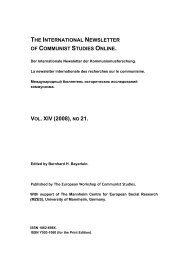11RXNdQ
11RXNdQ
11RXNdQ
Create successful ePaper yourself
Turn your PDF publications into a flip-book with our unique Google optimized e-Paper software.
The Political Thought of Patrice Lumumba* 89<br />
hygiene, etc. Did he not, on one occasion, even go as far as to thank Léopold II’s soliders<br />
for having delivered the Congolese from the ‘Savage Arabs’ who traded in black slaves?<br />
In those cases, he skates over the exploitation, the forced labour, the expropriations of<br />
property, the imposed crop-growing, the deliberately maintained illiteracy, the bloody<br />
repressions, the racism of the colonists. He limits himself to deploring the abuses of<br />
certain administrators or poor white settlers. At other times, the tone changes, as in the<br />
recorded speech of 28 October 1959 and, above all, in the famous reply to King<br />
Baudouin on 30 June 1960: ‘Our wounds still are too fresh and too painful for us to be<br />
able to banish from our memory our fate during 80 years of colonial rule …’, etc. Is it the<br />
same man speaking? Undeniably. Is he lying? Certainly not. But when he reveals now<br />
one, now the other of the two opposing conceptions of Belgium’s ‘civilizing’ work, it is<br />
because they co-exist within him and translate the profound contradiction of what can<br />
only be called his class. In spite of itself, colonial exploitation endowed the Congo with<br />
new structures. Using the generally accepted vocabulary, in the 1950s, 78 per cent of the<br />
population were coutumiers – peasants subject to customary rule and tribal struggles –<br />
while 22 per cent were extra-coutumiers, of whom the majority lived in the towns.<br />
Despite the Administration’s zeal in maintaining the population in ignorance, it was<br />
unable to prevent the rural exodus, the urban proliferation, proletarianization or, among<br />
extra-coutumiers, a degree of differentiation born of the needs of the colonial economy: a<br />
Congolese petty bourgeoisie of employees, public officials and shopkeepers was<br />
developing. This slender ‘elite’ – 150,000 people out of 14 million – contrasted with the<br />
country people held back by their rivalries and their traditions, led by ‘chiefs’ in the pay<br />
of the administration, and with the workers who, though violent at times, lacked a true<br />
revolutionary organization, and possessed only an embryonic class consciousness. The<br />
position of the black ‘petty bourgeoisie’ was extremely ambiguous at the outset because<br />
it believed that it gained benefit from colonization, and that this benefit enabled it to<br />
measure the iniquity of the system. In actual fact, its members – most of them very young<br />
since the class itself was a recent product of colonial development – were recruited by<br />
large firms or the Administration. There were not yet any who, at the age of 30, were<br />
petty bourgeois by birth. Lumumba’s father was a Catholic peasant who took him to the<br />
fields from the age of 6; it was the Passionist Fathers who decided that the child would go<br />
to school. Later, when he was 13, the Protestant missionaries pinched him from them.<br />
The role of the father and the child in all this seems to have been zero. Emile Lumumba<br />
disapproved of his son when, at the age of 13, he went to the Swedish mission, but what<br />
could he do? Everything was decided without them; ‘The Fathers’ wanted to make a<br />
catechist of him, while the more practical Swedish wanted to give him a profession that<br />
would allow him to leave the peasantry for the wage-earning class and live on his own<br />
land as an auxiliary of the colons, in one of the agglomerations created by the whites.<br />
Patrice spent his childhood in the bush: the misery of the black peasants’ life is well<br />
known, and without the religious organizations that took care of him, that misery would<br />
have been his lot, his only horizon. Did he understand immediately that the Missions<br />
were the recruiting agents for the colonial system? No, he probably did not. Did he see<br />
that the condition of rural life was, directly or indirectly, the product of colonial<br />
exploitation? He probably did not see this either: at about the time he was born, the<br />
Administration was realizing the disadvantages of too visible a coercion and of forced




